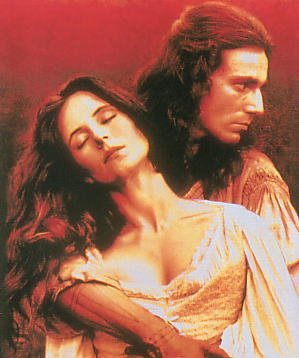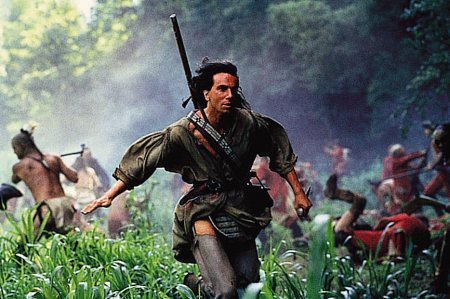The Last of the Mohicans (1992)
DIRECTOR: Michael Mann
CAST:
Daniel Day-Lewis, Madeleine Stowe, Russell Means, Wes Studi, Eric Schweig, Jodhi May, Steven Waddington, Maurice Roëves, Patrice Chéreau
REVIEW:
Based loosely on James Fenimore Cooper’s novel, Michael Mann’s (Manhunter, Heat, Public Enemies) The Last of the Mohicans is a sumptuous and stirring adventure, an enthralling viewing experience that should appeal to anyone who enjoys Braveheart or Rob Roy. By every conceivable standard, The Last of the Mohicans is in the same league, and it’s a grand, passionate, rousing adventure on its own merits.
 Orphaned as a child, Hawkeye (Daniel Day-Lewis), the son of white settlers, was taken in by the Mohican Chingachgook (Russell Means), and raised as his son and the brother of Uncas (Eric Schweig). Sometime after the outbreak of the French and Indian War, with the British battling the French for possession of the American continent, the three come to the rescue of two British women, Cora (Madeleine Stowe) and her sister Alice (Jodhi May), who have come to America to join their father, Colonel Munro (Maurice Roëves), who is pitted against French General Montcalm (Patrice Chéreau). Making their way to Munro’s besieged fort, the group is pursued by Magua (Wes Studi), a brutal Huron warrior who is zealously vengeful against Munro and his entire family for earlier anti-Indian campaigns. Cora meanwhile has been wooed for some time by a British officer, Major Duncan Heyward (Steven Waddington), but she does not return his affection- especially when she falls in love with Hawkeye.
Orphaned as a child, Hawkeye (Daniel Day-Lewis), the son of white settlers, was taken in by the Mohican Chingachgook (Russell Means), and raised as his son and the brother of Uncas (Eric Schweig). Sometime after the outbreak of the French and Indian War, with the British battling the French for possession of the American continent, the three come to the rescue of two British women, Cora (Madeleine Stowe) and her sister Alice (Jodhi May), who have come to America to join their father, Colonel Munro (Maurice Roëves), who is pitted against French General Montcalm (Patrice Chéreau). Making their way to Munro’s besieged fort, the group is pursued by Magua (Wes Studi), a brutal Huron warrior who is zealously vengeful against Munro and his entire family for earlier anti-Indian campaigns. Cora meanwhile has been wooed for some time by a British officer, Major Duncan Heyward (Steven Waddington), but she does not return his affection- especially when she falls in love with Hawkeye.
The film’s story has only a passing resemblance to Cooper’s (which Mann dismissed as plodding, shallow, and condescending in its portrayal of Native Americans). Mann has used the original story as the launching pad for a grand, passionate adventure tale with a heavy helping of romance thrown into the mix. And in case all the intense stares and heaving bosoms threaten to make the male viewers roll their eyes, there’s brutal battle scenes to liven things up. And then there’s the gorgeous scenery filmed by Dante Spinotti and the soaring, evocative score by Randy Edelman and Trevor Jones. The ‘good side’ and ‘bad side’ in the French-Indian War, if there was such a thing, is murky at best. In war, as in so many other aspects of real life, little is either completely good or evil. What’s clear is that neither the British nor the French give much consideration to the native population- either the Indians or the white settlers. Magua might be the “villain”, but he has his reasons. And as Major Heyward and Colonel Munro have their failings, so do they also have their virtues.
While, among the various challenging roles on Daniel Day-Lewis’ filmography, this one is pretty simple and straightforward, it gives him the chance to prove at least one thing, that he’s perfectly at home going into “action hero” mode, with a brawny, charismatic performance. He radiates magnetism, and is entirely credible as a romantic action hero. And despite a half-hearted British accent (of the “now you hear it, now you don’t” variety), Madeleine Stowe is more than capable in the role of Cora. And Mohicans proves that a smoldering glance can do more than a torrid sex scene. Day-Lewis and Stowe keep their clothes on throughout, but the scenes between them sizzle like few romantic pairings onscreen. Among the supporting cast, there’s not a weak performance to be found. Eric Schweig and Jodhi May have less to do than their screen siblings, but make us wish their subplot had been more-developed. Native American activist Russell Means is suitably dignified and authoritative (as well as no slouch in a fight) as Chingachgook. Steven Waddington and Maurice Roëves make Major Heyward and Colonel Munro flawed, but not evil characters. One could argue the most striking supporting character is Wes Studi’s Magua, who is as fearsome as they come—when he vows to cut out an enemy’s heart, he’s not bluffing—yet comes with a backstory of being legitimately wronged and damaged. Studi’s Magua is no scenery-chewing bad guy—he’s stoic throughout—but he radiates a forceful presence without so much as raising his voice, and commands attention every time he’s onscreen.
 Mohicans‘ flaws are so minor that they scarcely seem worth mentioning, but the movie drags slightly in the fort-centric midsection where our heroes are holed up in one place for a while. But when we get back into the wilderness, from a large-scale ambush and battle scene, to a river chase, to the climactic showdown, the movie has us in its grip and doesn’t let us go. The finale is as gripping and riveting a climax as any that comes to mind, holding us enraptured for ten straight unbroken minutes during which nary a word of dialogue is spoken, and caps off a stirring, enthralling, and satisfying adventure.
Mohicans‘ flaws are so minor that they scarcely seem worth mentioning, but the movie drags slightly in the fort-centric midsection where our heroes are holed up in one place for a while. But when we get back into the wilderness, from a large-scale ambush and battle scene, to a river chase, to the climactic showdown, the movie has us in its grip and doesn’t let us go. The finale is as gripping and riveting a climax as any that comes to mind, holding us enraptured for ten straight unbroken minutes during which nary a word of dialogue is spoken, and caps off a stirring, enthralling, and satisfying adventure.
* * * *